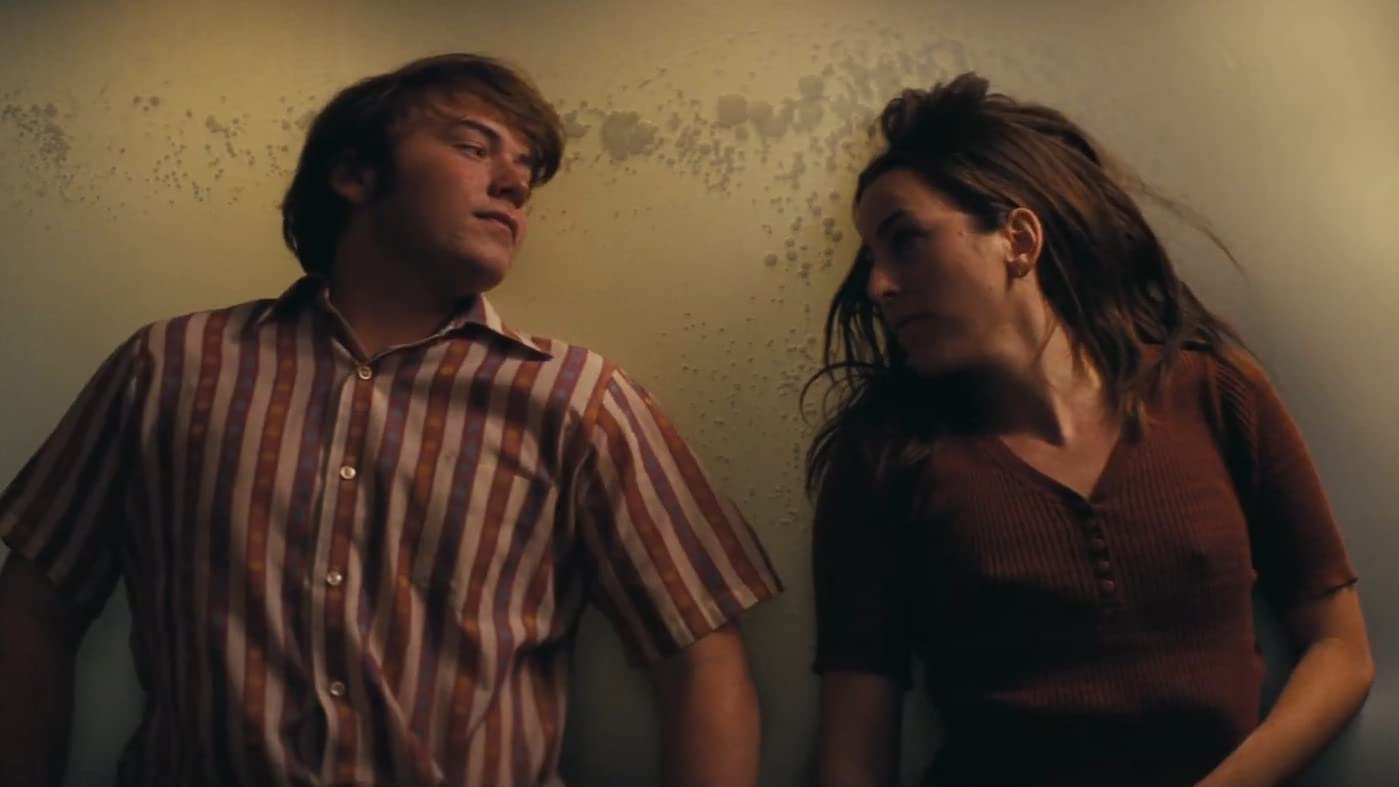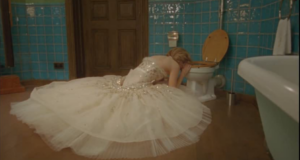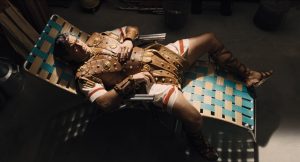Soaked in summer sweat and 70’s nostalgia, Licorice Pizza marks the return of director Paul Thomas Anderson with his first film since 2017’s Phantom Thread. Set in “the Valley” of Los Angeles, the film depicts the lovable yet objectionable relationship between Gary Valentine (Cooper Hoffman) and Alana Kane (Alana Haim) as they frolic through antics both mature and mischievous. After a meet-cute at Gary’s high school picture day, which Alana happens to be working, the two embark on loosely connected misadventures including a movie audition, a waterbed business, a motorcycle stunt jump, and a mayoral campaign, among other shenanigans. However, Licorice Pizza’s plot plays second fiddle to what the movie really wants to be: an unabashed embrace of carefree coming-of-age romance, and the thin line between childhood and adulthood. Even the film’s off-kilter title exemplifies this, a reference to a Southern California record store chain, which was chosen by Anderson as a “Pavlovian response and memory of being a child and running around.” The segments of Licorice Pizza that warrant its name are untouchable. Regrettably, these segments are tainted by certain off-color narrative choices and a swollen plotline.
To instill this mood, Anderson wraps his film in an irresistible coating of visual flair. Stylistically, Licorice Pizza is a knockout. The movie is permeated with layered, saturated color, ditching the prototypical beige and brown of 70’s film for hot pinks and deep blues. The camerawork excellently frames the simultaneously awkward and suave personalities of the story’s protagonists, with plenty of cheeky angles and clever asymmetry— ensuring the movie is rarely a bore to look at. When the camera really starts moving, such as a scene where Gary and his brother speed around handing out flyers, the film becomes a joy to watch. The costume design as well, which is dominated by boxy collars and chunky jeans, luxuriates in the nostalgia that fuels this feature, and is all the better for it.
The actors who inhabit these costumes are another of this film’s strengths. Cooper Hoffman, son of the late Philip Seymour, excels as Gary Valentine, taking full advantage of the quirks the character offers and bringing them to life. Gary’s offbeat entrepreneurialism and wise-beyond-his-years confidence are meant to be the elements that end up sucking Alana into his world, and Hoffman does a measured job portraying them, making the wise decision to not overplay these qualities and end up seeming artificial.
Cooper is joined by co-star Alana Haim playing Alana Kane. Alana is known for her membership in the pop rock band HAIM with her sisters Este and Danielle. Anderson has previously shot music videos for the group. Haim’s family, including her two sisters and parents, show up as Kane’s in-movie family, most memorably for a scene with an atheist boyfriend at a Jewish family dinner. Alana grew up in the Valley herself, a critical point for Anderson, who spent his adolescence there. For a first-time actor, Haim’s performance is impressive, lending credence to the half-grown, impulsive, and conflicted Alana Kane. She plays Kane as equal parts unstable and disinterested, and flourishes as her character progresses from social outsider to political volunteer, from indifferent to concerned.
The relationship of Gary and Alana has been the target of controversy, and not unjustly so. The two characters have an age gap of ten years, Gary being fifteen and Alana twenty-five when they first meet. Some have defended this facet of the story as innocuous, emphasizing the lack of any explicitly sexual contact between the two characters. This is a partially understandable argument, as most of the “romance” between Gary and Alana is confined to Gary boyishly attempting to flirt with Alana, and her ultimately shutting him down. If you squint really hard, you might be able to even call the relationship “for the most part platonic,” as at least one critic has. But to do so would be to ignore the many scenes in Licorice Pizza which make the age gap feel seriously out-of-place, such as when Alana flashes Gary, or a sexual monologue Gary pressures Alana to go on during a waterbed sales call. “If you tell me to make it sexy, I’ll make it fucking horny,” she remarks afterward. The film’s climax features a kiss between the two, surrounded by bright lights and swelling music. The moment felt triumphant, and reminiscent of the unpleasant media trope where younger men “score” with older women. It left this moviegoer uncomfortable and questioning this movie’s thoughts on relationships with minors.
Paul Thomas Anderson is not a stranger to portraying complicated romances. In 2002’s brilliant Punch-Drunk Love, Anderson paints a delicate picture of a relationship fraught with social anxiety and emotional abuse, weaving a plot that handles those issues with nuance and care. Licorice Pizza, on the other hand, trades the deft subtlety of Anderson’s previous work for a more feel-good tone. What results is moments where the movie tries to analyze some of its relationship’s more difficult aspects, and it comes off as alarming and unsettling. Gary’s adolescent pinings for Alana feel like Anderson’s own naive longing for a bygone era, but an underage relationship isn’t a tasteful metaphor to portray this.
Sadly, this is not the only pitfall of this film. The structure of Licorice Pizza is that of several slice-of-life vignettes. While this certainly adds a level of charm, it makes the movie feel inconsistent and unfocused. Without the plot beats doing much to build on each other, the story lacks a sense of momentum, and by breaking up the narrative so much, certain sections of the movie feel far less polished than others. However, some scenes really do steal the show. Alana and Gary’s showdown with cocaine-addled film producer Jon Peters (Bradley Cooper) is a boisterous scene that crescendos into a tense backward-slide down an LA hill in a moving truck with a tank on empty. Another highlight is a dinner scene in which Alana finds herself caught up in the domestic quarreling of closeted mayoral candidate Joel Wachs (Benny Safdie). It contains a moment of surprising emotional resonance, refreshing for a movie which can’t seem to see the 70’s as much more than a jaunty paradise.
Scenes like this are unfortunately dragged down by others—especially those featuring Sean Penn, who plays a film director who gets involved with Alana. The two go to a local restaurant and run into Gary, and a long-winded, pointless scene ensues, which feels like little more than an indulgence on the part of Anderson. Various other moments, most of which feel ineffectual and redundant, bloat Licorice Pizza as it meanders toward the end of its two-hour and thirteen-minute runtime. Structuring the movie with more intention could have done wonders to help alleviate this lopsidedness. Sadly, that’s not what happened.
Such missteps are disappointing, especially for a seasoned filmmaker such as Anderson. Fortunately, these flaws don’t completely smother Licorice Pizza. Underneath some confusing and disquieting aberrations is a movie with a heartwarming core, even if some fine-tuning would’ve done the end product well. As a love letter to the 70’s, Licorice Pizza surfs along its wave of nostalgia expertly, and as a coming-of-age drama, it’s childlike exuberance helps it soar.






